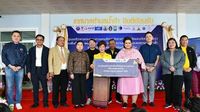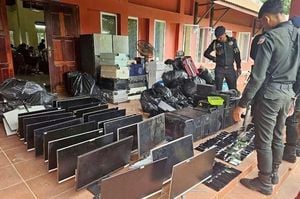On March 24, 2025, significant governmental initiatives kicked off to alleviate poverty and stimulate economic growth in Thailand, specifically focusing on low-income citizens. The Government Savings Bank (GSB) unveiled a new credit loan program aimed at supporting those without access to traditional financial services. The program, dubbed 'Credit Creation, Opportunity Creation', seeks to empower the underprivileged, allowing them to bolster their financial standings and integrate into the formal economic system.
The GSB's 'Credit Creation, Opportunity Creation' initiative is tailored for individuals at the grassroots level, including small business owners, casual workers, and self-employed individuals. The maximum loan amount available under the program is 20,000 baht (approximately $580), with no collateral required. A three-month grace period allows borrowers to focus on paying only interest before starting to repay the principal, making it more accessible than traditional loans.
The loan comes with a fixed interest rate of just 0.60% per month, significantly lower than the rates offered by informal lenders. This means, for example, a loan of 10,000 baht incurs a modest interest charge of just 60 baht per month. For those needing the full 20,000 baht, the monthly interest would rise to 120 baht, a manageable sum for many who often struggle to access credit.
Eligibility for this loan program includes Thai nationality, no existing credit history, age between 20 and 65, and a stable source of income, whether from employment or self-employment. The GSB's ambitious target is to assist 300,000 individuals in its first year, with plans to expand this by reaching one million applicants in three years.
Alongside this initiative, the municipality of Nakhon Pathom has been embracing technology to improve public services through the newly established 'Public Complaint Receiving System', implemented in collaboration with LEXTECH, an ICT solution provider. The system enhances the efficiency of handling public complaints through artificial intelligence technology.
Nakhon Pathom has faced challenges in processing a high volume of complaints received via various channels such as phone calls, letters, and in-person reports. This led to data redundancy and hindered their ability to respond swiftly. The new AI system captures complaints, distinguishes between suggestions and grievances, and promptly directs the complaints to relevant departments, thereby optimizing communication channels.
Mr. Somchok Pongkwan, Deputy Mayor of Nakhon Pathom, noted the positive impact this system offers, stating, “The Public Complaint Receiving System serves as a bridge for citizens to communicate with us effectively. It simplifies the feedback process, enhancing our responsiveness,” emphasizing its importance in achieving transparency and engagement with the local population.
Not only does this innovative approach streamline government operations, but it also enables real-time updates—citizens can track their complaints’ progress and receive immediate information about their local government’s response. A QR code system facilitates easy access for residents to submit complaints, ensuring that even those who might struggle with traditional methods of communication feel included in local governance.
Meanwhile, the Minister of Higher Education, Science, Research, and Innovation, Miss Supamas Issarapakdee, visited Si Kheow Province to assess efforts directed at addressing poverty and inequality. She participated in a collaborative event titled “Maha Krongkarn Kaek Chon Kon Khong Phra Racha,” an initiative that brings together educational institutions and local fund management agencies to foster better living conditions through skill development and community engagement.
The event's core theme was to empower communities through knowledge and structures that mitigate poverty effectively. By leveraging a comprehensive household data system known as “Sisaket Equity System-SES,” the government can conduct assessments to identify vulnerable populations proactively.
“This collaborative effort allows us to create effective projects aimed at skill development while ensuring everyone accesses their rightful benefits to combat poverty comprehensively,” stated Miss Supamas, emphasizing that the SES system facilitates the integration of marginalized communities into formal economic channels.
Innovative solutions, including safe vegetable models, food processing techniques, and welfare funds for vulnerable households were discussed, looking to provide improved income and sustainability. The SES initiative has reportedly helped households increase their earnings on average by 3,000 baht per month, fostering a network of community enterprises that contribute to local economic strengthening.
While challenges such as disaster management remain, efforts to create welfare funds for at-risk households are underway. The collaborative initiatives are designed to ensure communities can withstand emergencies while providing pathways for skilled work and accessibility to essential services.
These comprehensive approaches reflect the government’s commitment to improving the quality of life for its citizens through modernized support mechanisms and strategic partnerships designed to bridge existing gaps. The goal is not only to reduce poverty and inequality but also to promote an inclusive society where all can thrive in an equitable environment.
As these initiatives unfold, the Thai government appears dedicated to rooting out systemic issues that hinder progress, ensuring that the most vulnerable populations receive the support needed to uplift themselves in the fast-paced modern world.

![ออมสินลุยช่วยคนรายได้น้อย! เปิดตัว ‘สินเชื่อสร้างเครดิต สร้างโอกาส’ กู้ง่าย ไม่ต้องค้ำ ดอกเบี้ยต่ำกว่านอกระบบ [ADVERTORIAL]](https://thumbor.evrimagaci.org/Kjl9eP9n1f2noOYxh4Zkj9Hoymw=/200x0/tpg%2Fsources%2F2154a798-8f2e-498b-a61c-c171930931a2.jpeg)




